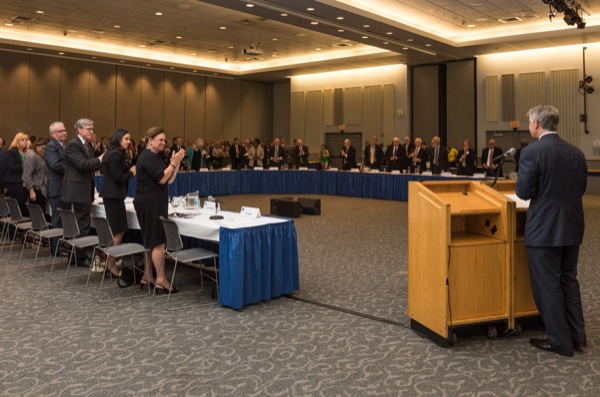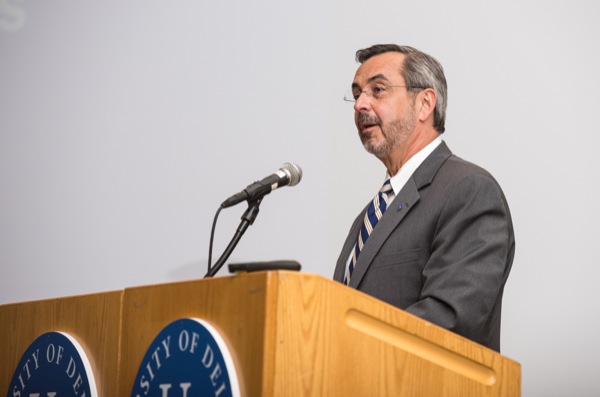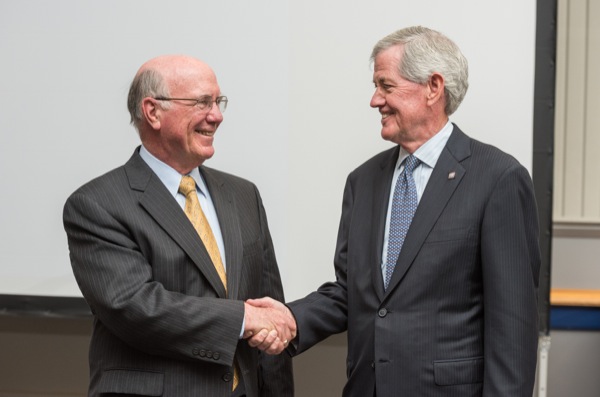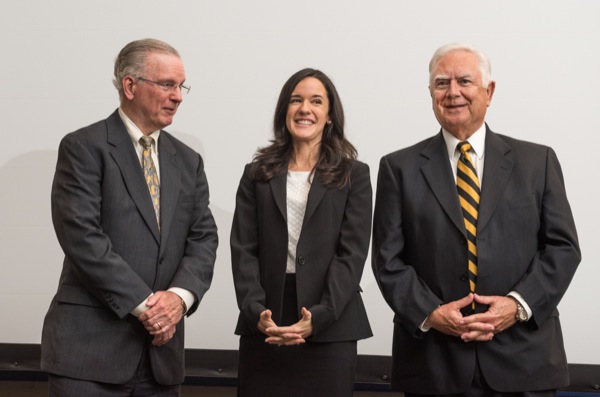


Trustees meet
Board hears presentations on strategic plan, Class of 2019
8:46 p.m., May 12, 2015--The University of Delaware Board of Trustees heard presentations on the new Delaware Will Shine strategic plan, the work of the Center for the Study of Diversity and faculty achievements during its semiannual meeting held Tuesday, May 12, in the Trabant University Center.
The Board also heard from President Patrick Harker who, in his final address to the trustees, thanked members of the campus community for their contributions to UD’s continued success as a leading academic and research institution.
Campus Stories
From graduates, faculty
Doctoral hooding
Harker is stepping down at the end of June to become president and chief executive officer of the Federal Reserve Bank of Philadelphia.
“This will be one of my last chances to publicly express my gratitude to all of you, and to acknowledge the many people I’ve had the privilege to work with over the past eight years,” Harker said. “To Howard Cosgrove and Gil Sparks and all the Trustees, thank you for your support, your wisdom and courage. You have ensured that this University will continue to be a leader and a positive force for change in Delaware and the world.”
Harker also lauded UD faculty and staff members and students for their wisdom, experience, hard work and enthusiasm.
“You are the reason our students come to UD, and the reason they call UD home, and the reason they consider their years on this campus to be some of the best in their lives,” Harker said. “To the students, thank you for your curiosity, your passion and your sincere desire to do nothing less than change the world. The vitality you bring to this University gives meaning and purpose to my job.”
In thanking members of the UD family -- including alumni and friends -- for their encouragement, Harker also noted that serving as president of UD has been a privilege and the highlight of his career.
“I never expected to be a university president, never considered it as a career goal,” Harker said. “But if I could have foreseen all of the amazing aspects of this job — working with so many exceptional people to transform lives and communities — it’s what I would have wanted all along. Only a once-in-a-lifetime offer could have pulled me away."
Harker also recalled the creation of the first strategic plan, the Path to Prominence, launched in 2008, and shared his optimism about the new Delaware Will Shine initiative.
“It captures and gives voice to the aspirations of UD’s people,” Harker said. “I commend Provost Domenico Grasso, Vice Provost Charlie Riordan, and all those who have worked so hard to shepherd that initiative to completion.”
Noting achievements including the construction of the Interdisciplinary Science and Engineering Laboratory and the acquisition of the 272-acre Science, Technology and Advanced Research (STAR) Campus, Harker also expressed confidence in UD to meet future challenges.
“As president of UD, I’m proud of what we accomplished together, and as president of the Federal Reserve Bank of Philadelphia, I’ll continue to be invested in your success,” he said.
Class of 2019
Chris Lucier, vice president for enrollment management, presented a look at the 4,000-plus students projected to arrive on campus this fall as members of the Class of 2019.
“We will welcome another amazing class, historic in many regards, to the University of Delaware in August,” Lucier said.
The freshman class, he noted, will be approximately 200 students over the target, and will present many challenges to the academic units in terms of course capacity in high-demand courses and academic support services, and also to those departments involved in student life.
Projected drop-add enrollment is expected to be 4,075, with a plus-minus factor of 50, compared to 4,179 students in fall 2014, Lucier said.
The Class of 2019 is expected to include 1,225 students from the First State and 2939 nonresidents, with the diversity of the entering class consistent with fall 2014, Lucier said.
“We received 2,224 deposits from underrepresented minority students this year, compared to 2,231 last year,” Lucier said. “We have received 66 deposits for international students, compared to 58 last year."
Lucier noted a significant increase in the quality of the freshman class based on SAT scores and grade point averages.
“The average SAT is 14 points higher than last year and 35 points higher than two years ago, with the average GPA up from 3.62 to 3.68,” Lucier said. “Enrollment in our Honors Program is also over the target, with 632 deposits and a forecast of approximately 620 students against a target of 525 students.”
Some 400 students have made deposits for UD’s award-winning Associate in Arts Program, up from 284 in 2014 and slightly above 2012 and 2013.
Two new programs launched in the 2014-15 academic year to diversify sources of new student enrollment also were successful, Lucier said.
“The World Scholars Program, where matriculated students will spend their first semester at John Cabot University in Rome and then return to Newark, will enroll 39 students, including 14 from Delaware,” Lucier said. “The Delaware in DC Program, where students admitted to the spring semester have an opportunity to spend their first semester at American University in Washington, D.C., will enroll 50 students.”
While the University’s market positioning in terms of admissions is strengthening, Lucier cautioned against becoming complacent in the overall current enrollment environment.
“Just a few years ago, yield was around 24 percent, and we were having to go deep into our wait list to enroll a class, and the diversity was not consistent with our goals and values,” Lucier said. “We are on solid ground, but we must continue to provide an exceptional experience in and out of the classroom that leads to opportunities for our students to get great jobs or enroll in superb graduate programs.”
Provost’s report
Grasso lauded Harker for his leadership, vision and support of the Delaware Will Shine strategic plan, which was approved by the trustees later during the meeting.
“There have been only two times when I’ve changed my career path based simply on my respect for the leader I’d been joining,” Grasso said. “The second time was due to you, Pat, whom I admired immediately for your thought leadership, global vision and broad experience.”
Grasso noted that a new strategic plan has been a major objective since he arrived on campus nearly two years ago.
“From the very beginning, and with good reason, we understood that any new plan would be built on the strong foundation of the Path to Prominence,” Grasso said. “With that in mind, when Pat asked me to develop a new strategic plan, I immediately knew it had to be something the entire community could own.”
Grasso said that the process was to be open and inclusive, relying on the strengths and character of the University campus resources and the good people of the local and regional community.
“That’s a big part of why I am excited to be here today to share my thoughts about how we successfully crafted a new strategic plan, Delaware Will Shine,” Grasso said. “It was devised through an intensely broad, wide-ranging process of allowing all members of our community to contribute, both inside the campus walls and beyond.”
Grasso described the new strategic plan as being without any prescribed time horizon.
“This is a plan that epitomizes our aspirations and our values, and will serve as a living and fluid document without any expiration date,” Grasso said. “It is a framework for how we will build our community and invest in our future. It is a bold statement. We will relentlessly pursue excellence, we will be consequential in the course of human events, and we will tackle the grand challenges and the great debates of our times.”
Diversity scholarship
James Jones, professor of psychology and director of the University’s Center for the Study of Diversity, discussed scholarship that drives diversity practice.
“This is critical for our future,” Jones said. “This also is critical for the success of our students as we prepare them for future careers.”
Jones noted that the most significant diversity challenges for UD are to increase admission and graduation of more diverse groups of students and to prepare all students to participate effectively in a more diverse society.
“It is important that we adopt proven successful intervention principles, including belonging, affirmation, cultural matching and rejection sensitivity,” Jones said. “The world is diverse and by 2042 we will be a nation of minorities. We need to prepare all students to enter and participate effectively in a more diverse society.”
Sharelle Law, graduate assistant and doctoral candidate in the Department of Human Development and Family Studies, and Alexis Wiggins, undergraduate researcher and senior in the Department of Psychological and Brain Sciences, shared their experiences working in the Center for the Study of Diversity.
Strategic plan
Charlie Riordan, deputy provost for research and scholarship and professor of chemistry and biochemistry, outlined the results of the Delaware Will Shine strategic planning initiative.
“There were about 100 working group members, and we hosted numerous meetings with constituent groups on-and-off-campus,” Riordan said. “This also involved an interactive website and blog, concept papers and draft documents, and the inception of the Thought Leadership speaker series, of which President Harker was the first speaker.”
Riordan said that furthering UD’s reputation as a pre-eminent learner-centered research university calls for a commitment to emphasize learning, scholarship and engagement.
“We looked at where we have unique capabilities that are focused on student experiences,” Riordan said. “Our students need to have skills that will allow them to be contributors to society for years to come.”
Addressing grand challenges includes educating the global citizen, advancing cultural understanding and creative expression, bridging opportunity divides, building a sustainable economy, advancing health and wellness, innovating energy and environmental solutions and ensuring safety and security.
Riordan also noted that advancing the University will be achieved through five strategic initiatives, which include building a welcoming and collaborative campus community, innovative education design, multidisciplinary research and scholarship, campus safety and wellness, and community engagement.
“To focus and prioritize our aspirations to be counted among the world’s premier research universities, the University of Delaware sets the goal of achieving scholarly productivity, breadth and impact on a per capita basis that will be on par with the top half of the Association of American Universities public universities by 2025,” Riordan said. “This goal is very important and very obtainable.”
Board actions
At the meeting, the trustees approved several resolutions:
- Dining rates were increased by an average rate of 2.5 percent and residence hall rates by an average of 2.25 percent, effective with the fall semester.
- The student comprehensive fee for full-time students was decreased to $299 per semester, and several fees were kept at current levels, including the per semester fee for part-time students, winter and summer sessions fees, Student Health Services fees, the University Student Centers fee and the Graduate Student Recreation fee.
- The new Academy Street dining and residence halls will be named for Caesar Rodney, the Delaware statesman and signer of the Declaration of Independence. This continues the tradition of having a campus residence hall named in his honor. The new Rodney Complex will include the Rodney Dining Hall and Rodney A, B and C Residence Halls.
- Personnel actions, including the promotion of faculty, were approved.
- The ecology major will be disestablished, effective Sept. 1.
- The name of the Speech-Language Pathology Program will be changed to the Program in Communication Sciences and Disorders, effective July 1.
- Morton Collins, Jeffrey D. Sachs, Ruth J. Simmons, Jewel Walker and David DeWalt will receive honorary degrees during the 2015 Commencement ceremony on May 30.
- The University’s 2015 strategic plan, Delaware Will Shine: A Blueprint for a Preeminent Learner-Centered Research University, was approved.
- The appointment of Franklin Newton as acting vice president and acting chief of staff at the University of Delaware, effective July 1, was ratified.
- The president was authorized to confer degrees at Commencement on May 30.
Board business
Two new trustees were elected to the board: Terence Murphy to a six-year term and Nathanial Rosal, a member of the Class of 2015, to a two-year term as the recent graduate trustee.
Elected as officers were John R. Cochran, chair; Terri L. Kelly, vice chair; William B. Chandler III, vice chair; and Mary Jane Willis, secretary/treasurer.
Board Chairman Gil Sparks concluded the meeting with two special resolutions in honor of Harker.
Article by Jerry Rhodes
Photos by Kathy F. Atkinson












